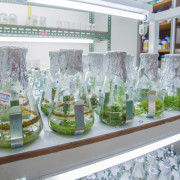- Science News
- Featured news
- In conversation with Professor David Segal, Field Chief Editor for Frontiers in Genome Editing
In conversation with Professor David Segal, Field Chief Editor for Frontiers in Genome Editing
Frontiers in Genome Editing is an open access journal dedicated to ensuring genome editing becomes an accessible and transformative tool with a spectrum of applications from human health to plant sciences.

Professor David Jay Segal joins Frontiers in Genome Editing in a new capacity as Field Chief Editor alongside his Specialty Chief Editor role for the Genome Engineering and Neurologic Disorders section. Prof Segal holds joint appointments at the University of California Davis of Medicine, the Genome Centre, and the MIND Institute. He has over 20 years of experience engineering gene and epigenetic systems as molecular tools and therapeutics.
Here, Frontiers journal manager Alice Miller asks Prof Segal about his research, his role as a Field Chief Editor and the future of genome editing.
Alice Miller (AM): How did you develop your interest in genome editing and what is the current direction of your research?
David Segal (DS): I went to the University of Utah for graduate school to work with Mario Capecchi, who would later win the Nobel Prize for “gene targeting”. However, I ended up working with Dana Carroll, who wanted to understand how these edits could be made more efficiently. My first publication, in 1995, showed that making a targeted double-strand break (DSB) in the chromosome could stimulate the DNA repair by approximately 100,000-fold (Maria Jasin has published her landmark study with this same conclusion only a few months earlier). This set off a race to develop tools for making targeted DSBs. During my post-doc with Carlos Barbas at The Scripps Research Institute, I helped develop the most widely used method for engineering zinc finger proteins, which led to the zinc finger nucleases (ZFNs) that were used to essentially create the modern paradigm of gene editing. As progressively more efficient DSB tools were developed, such as transcription activator-like effector nucleases (TALENs) and clustered regularly interspaced short palindromic repeat (CRISPR), my independent lab at University of California, Davis incorporated their use in our efforts to improve human health. For the past 20 years, we have primarily focused on epigenetic editing as an approach to treat neurologic disorders, with a recent major effort to use Cas13d for the treatment of Angelman syndrome. I like to tell my graduate students that I am still kind of working on my PhD project.
AM: What motivated you to join Frontiers and become the Field Chief Editor for Frontiers in Genome Editing?
DS: Everyone has heard of Frontiers because they have a truly worldwide appeal. Perhaps more than any other publisher, Frontiers tries to incorporate authors and editors from all over the world. All their publications are open access, which is essential today. When I heard that they were starting up a new journal in genome editing_,_ I was so excited, and incredibly humbled and honored to have been selected as the Field Chief Editor for this new title. For me, this is a once-in-a-career experience to work with the third most-cited publisher in the world to build what will clearly be global community of authors influencing the explosive growth of this field.
AM: What milestones has Frontiers in Genome Editing achieved since its launch in November 2019 and what is your vision for its next steps?
DS: Our stated goal is to become the most influential journal in this field as measured by citations and volume, and we already moving in that direction. Since late 2019, and despite the onset of a global pandemic, Frontiers in Genome Editing has built up an impressive assembly of 400+ Editorial Board members across the five initial sections of the journal. This group has worked collaboratively to establish 30+ Research Topics that have already led to the publication of over 70 open access articles. We achieved the Directory of Open Access Journals indexation in 2020, PubMed indexation in 2021, and now have our sights set on achieving the milestone of a Journal Impact Factor in the coming years.
The development of a method for genome editing has had a revolutionary impact already and gained further momentum since the 2020 Nobel Prize for Chemistry was awarded to Profs Doudna and Charpentier. What do you think the future of genome editing holds in terms of opportunities and hurdles to overcome, and how is it poised to address global challenges?
DS: Impressively, this field is still expanding in all directions, from the basic discovery of new smaller CRISPR systems, to new platforms such as Prime Editing and CRISPR-Off. There are so many opportunities to use these tools to study and manipulate living systems, as well as to continue improving existing tools and developing new ones. There have already been several advanced applications such as clinical trials, edited crops and livestock, and the control of deadly pests with gene drives.
All the major application areas have emerging hurtles too. In medicine, a critical issue is the astounding cost of treatments (around US$1-2M) which threatens to preclude their benefit to vulnerable populations afflicted by one of the 7,000 monogenic disorders. In agriculture, critical issues remain acceptance and regulatory policy even in the face of a warming world. Recent efforts to combat disease-carrying rodents and deadly mosquitoes with gene drives have raised issues of safety and process. This is a wonderous and impactful time to be involved in this work, which will increasingly require greater collaboration between basic and applied scientists, clinicians, industry, policy makers, and of course the communities affected by these global changes.
AM: Finally, which areas of research would you like to see highlighted as Research Topics and published more within Frontiers in Genome Editing?
DS: Research Topics (article collections) in the Frontiers journals are largely led by a small group of editors, focused on a particular topic of current importance and include authors in this sub-field. Thus, in addition to its role in attracting publications in the focus area, the Research Topic has the effect of building communities. The emphasis of the journal on creating Research Topics gives Frontiers in Genome Editing the opportunity and the mandate to help build those critical collaborations needed to address the future of this technology. We will need Research Topics that range from the very technical and detailed to the big picture of global impacts. Our ability to build these communities from around the globe is what will help make Frontiers in Genome Editing the most influential journal in this field.
Please find the open Research Topics here: www.frontiersin.org/journals/genome-editing#research-topics
For general journal information, submission details and to inquire about guest-editing a Research Topic, please visit the official website of Frontiers in Genome Editing via the link below or contact us via email (genomeediting@frontiersin.org): www.frontiersin.org/journals/genome-editing
Alice Miller is an experienced publishing professional working for Frontiers as a Journal Manager. She manages two journals, Frontiers in Bioengineering and Biotechnology and Frontiers in Genome Editing. Alice completed an integrated masters in Biological Sciences and specialized in Human Genetics at University College London.








